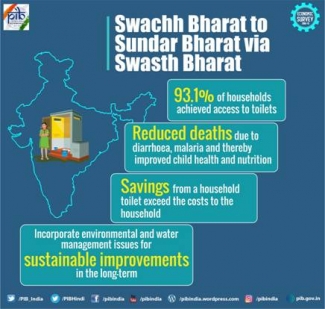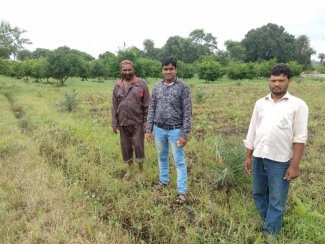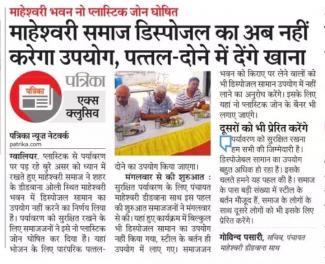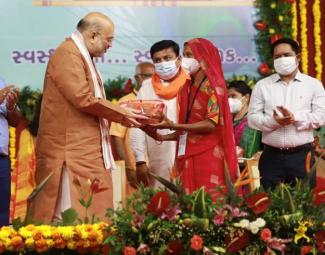
Over 5.5 lakh villages declared ODF
SBM provides access of toilets to 93.1% of households
30 states/UTs are 100% covered with IHHL
ODF results in reducing deaths due to diarrhea and malaria
The Union Minister for Finance and Corporate Affairs, Nirmala Sitharaman tabled the Economic Survey 2018-19 in Parliament today. The Economic Survey has outlined the progress made in the Swachh Bharat Mission (SBM) that was initiated in 2014 to achieve universal sanitation coverage by 2nd October 2019. This flagship programme is one of the largest cleanliness drive as well as an attempt to effect behavioural change in the world. Through SBM, 99.2 per cent of rural India has been covered in the last four years. Since October 2014, over 9.5 crore toilets have been built all over the country and 564,658 villages have been declared Open Defecation Free (ODF). As on 14 June 2019, 30 States/UTs are 100 per cent covered with Individual household Latrine (IHHL). SBM has significantly improved health outcomes.
SBM has helped reduce diarrhea and malaria among children below five years, still birth and low birth weight (new born with weight less than 2.5 kgs). This effect is particularly, pronounced in districts where IIHL coverage was lower is 2015. SBM is one of the largest cleanliness drives in the world and has brought in a remarkable transformation and traceable health benefits. The focus under this mission has not just been on construction of toilets but also on effecting a behavioral change in the communities. The result has been substantial gains in health parameters as shown by various studies. The gains from the cleaner India are important inputs, directly as well as indirectly, for achieving broader economic development objectives.
Solid and Liquid Waste Management (SLWM)
Economic Survey says that “Solid and Liquid Waste Management (SLWM) is another major component of SBM Mission. Many states have undertaken activities such as construction of waste collection centres, menstrual hygiene management activities, installation of bi-gas plants, construction of compost pits, installation of dustbins, system for collection, segregation and disposal of garbage, construction of drainage facility and leach pits and construction of soak pits and stabilization ponds.”
In terms of the impact of SBM on the physical environment, a very recent study by UNICEF, in association with MoDWS indicates considerable impact on combating contamination of water, soil and food. The findings from the study indicate that these substantial reductions may potentially be attributed to the improvement in sanitation and hygiene practices, as well as supportive systems such as regular monitoring.
Way Forward
Economic Survey says that “SBM has brought in a remarkable transformation and traceable benefits to the society as a whole. It is one of the largest cleanliness drives in the world. Many States have achieved the status of 100 per cent ODF and IHHL coverage, thereby has led to a sea change in the dignity of people, especially women. This mission acts as a driver for eliminating the gender disparity through the construction of gender-specific latrines in public areas such as schools, roads and parks. This public movement will have indirect positive impact on society by increasing the enrolment ratio of girls in schools and improving health standards.”
India’s phenomenal journey towards sanitation for all have ensured the social, environmental and economic gains by ensuring that the behevioural change gets rooted in people’s consciousness. The mission has brought one of the largest behavioral change in its citizenry. The mission mirrors the National Developmental priorities by focusing on the gender equality and women empowerment. Importantly, it is also aligned with the 2030 global sustainable development agenda and SDGs especially the SDG 6.2- “By 2030, achieve access to adequate and equitable sanitation and hygiene for all, and end open defecation, paying especial attention to the needs of women and girls and those in vulnerable situations”.











